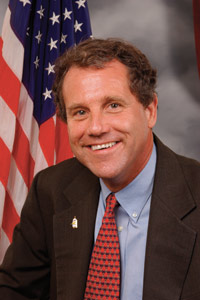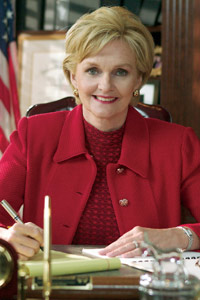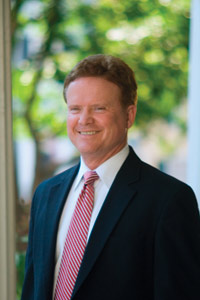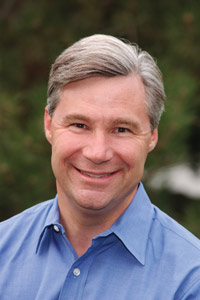Six candidates oust incumbent Republicans
FOR DEMOCRATS, REGAINING control of the U.S. Senate in the 2006 midterm elections was the longest of long shots. They had to keep Democrats in two open seats, in Minnesota and Maryland; all Democratic incumbents had to be returned to office; and six Republican incumbents had to lose to Democratic challengers.
When all three events came to pass, the Democrats held the majority by a single seat — 51-49. This includes Independents Bernie Sanders (VT) and Joe Lieberman (CT), who say they will caucus with Democrats.
Five of the six Democratic challengers who replaced Republicans are new to the U.S. Congress. Sherrod Brown of Ohio is the exception, having served in the U.S. House. The others, Bob Casey (PA), Claire McCaskill (MO), Jon Tester (MT), Jim Webb (VA), and Sheldon Whitehouse (RI), come from varied backgrounds: a state treasurer, a state auditor, a farmer, a war hero, and a U.S. attorney.
Sherrod Brown (D-OH)

Sen. Sherrod Brown
“SHERROD BROWN STRONGLY opposes misguided trade agreements that cost millions of American jobs. He organized Democratic opposition in the House to CAFTA, working closely with organized labor and other allies. Nobody has done more in Congress to promote trade fairness and fight for an end to job-killing trade agreements. He will continue to be our champion on this issue as a United States senator.” — Abe Breehey, assistant director of government affairs
BOILERMAKERS BACKED Sherrod Brown with campaign donations and get-out-the-vote efforts in a U.S. Senate race seen by labor as critical to the future of U.S. trade policies. Wracked by jobs shipped overseas and an ethics scandal involving its Republican governor, Ohio appeared ready for change. And change came. Brown unseated two-term Republican incumbent Mike DeWine, winning by a 56-44 percent margin.
Elected to the U.S. House in 1992, Brown, 54, was re-elected six times in the heavily Democratic 13th District in the Cleveland area. He was last year’s co-recipient of the Boilermakers’ Legislator of the Year award at the Brotherhood’s LEAP conference. In 2005 he earned a 100 percent voting record on Boilermaker issues and 93 percent from the AFL-CIO. That same year, Brown led the Democratic effort to block the Central American Free Trade Agreement (CAFTA) in the House, lining up substantial bipartisan support. However, in unusual circumstances that included a late night session, the Republican majority held open a roll-call vote well past the standard 15 minutes, mustering additional support. CAFTA passed by one vote, 217 to 215 (a tie would have resulted in a defeat). Brown said this stinging outcome prompted him to run for the U.S. Senate.
Soon after being elected to the U.S. House, Brown fiercely criticized the North American Free Trade Agreement (NAFTA). He went on to play a key role in efforts to defeat fast-track trade negotiating authority in Congress.
During his political career, Brown has been a strong supporter not only of fair trade, but also of job creation, affordable health care, and other issues important to working families.
While the ranking minority member of the House Energy and Commerce Committee’s Health Subcommittee, Brown gained national attention by pushing for affordable prescription drugs. He led the effort to close legal loopholes used by brand-name drug companies to prevent price competition. He also sponsored bus trips to Canada for his Ohio constituents to get prescription drugs for up to 80 percent less than U.S. prices.
Brown was first elected to office in 1975, becoming one of the youngest state representatives in Ohio’s history. In 1982, he won the general election for the office of Ohio secretary of state, serving eight years in that position.
Brown’s first book, Congress from the Inside: Observations from the Majority and the Minority, is in its third edition. His latest book, Myths of Free Trade, was published in September 2004.
Robert Casey Jr. (D-PA)

Sen. Robert Casey
“Bob Casey seems to be a centrist Democrat and is likely to go his own way on social issues. However, on the key economic challenges facing working families, he appears to support labor positions fairly well.” — Abe Breehey, assistant director of government affairs
ROBERT (“BOB”) CASEY JR., defeated Republican incumbent Rick Santorum for the Pennsylvania U.S. Senate seat by a margin of 59-41 percent.
Casey falls closely in line with mainstream Democratic policies. He criticizes what he views as “draconian cuts to Medicare and Medicaid;” supports the Family and Medical Leave Expansion Act, which would include companies with at least 25 employees; and opposes privatizing Social Security. He criticizes many recent tax cuts, claiming they have “not caused the ‘trickledown’ economic growth” that was promised from them, and supports increasing the minimum wage.
On environmental issues, Casey supports increased federal investment in hybrid and alternative fuel technology to help wean the United States off of foreign oil. He also supports increased funding for the Brownfield cleanup (an international coastal cleanup), as well as a reinstatement of the polluter-pays principle.
The eldest son of the late Pennsylvania Governor Robert P. Casey, Bob Jr. has worked as an educator and attorney. He practiced law until 1996, when he was elected Pennsylvania state auditor general — the Commonwealth’s fiscal and public safety watchdog.
Casey ran for state treasurer in 2004, setting two new records for Pennsylvania: winning in the heaviest voter turnout ever, and with more votes than ever before for a statewide office.
He then won the 2005 Democratic primary for U.S. Senate in a landslide, receiving almost 85 percent of the votes. On election night, Casey’s margin of victory was the highest ever for a Democrat running for the U.S. Senate in Pennsylvania. He is also the first Pennsylvania Democrat elected to a full term in the Senate in his own right since Joseph S. Clark was re-elected in 1962.
As a U.S. senator, Casey says he will focus on creating jobs, restoring fiscal responsibility, lowering the cost of health care, improving education, safeguarding Social Security, protecting our environment, and strengthening homeland security.
On November 15, 2006, Senate Majority Leader in waiting Harry Reid appointed Casey to several committees, including the United States Congress Joint Economic Committee, where Casey can put his “fiscal and public safety watchdog” experience to good use.
Claire McCaskill (D-MO)

Sen. Claire McCaskill
“Claire McCaskill has proven to be a tough political fighter who is not put off by big challenges. Beating Sen. Jim Talent in Missouri was a huge achievement. We think she has the right priorities and should be an asset for labor.” — Bridget Martin, director of government affairs
CLAIRE MCCASKILL, former Missouri state auditor, defeated Republican Sen. Jim Talent for her state’s U.S. Senate seat by a margin of 50-47 percent. In her campaign positions, she said she would support raising the minimum wage, cutting middle-class taxes, and cracking down on deficits and reckless spending. Regarding health care, she vowed to fight for the interests of everyday people, not HMOs, drug companies, or insurance interests. She said she would oppose Social Security privatization efforts and would seek to save pensions from corporate raiders.
Except for three years spent in private practice as an attorney (1989 to 1991), McCaskill, 53, has worked in the public sector continuously since graduating from law school. She worked in the state courts and also served in the Jackson County prosecutor’s office. In 1982, she was elected to the Missouri House of Representatives, where she became the first female attorney to serve in that body in some 40 years.
McCaskill served on the Jackson County legislature (the equivalent of a county commission or county council) and later became the first woman to be elected Jackson County prosecutor. In 1998, she was elected state auditor, becoming only the second woman state auditor in Missouri history.
When McCaskill defeated Governor Bob Holden in the 2004 Democratic primary race, she became the first person to defeat an incumbent governor in that state’s history. When she later lost to a Republican candidate, it marked McCaskill’s first defeat in her 20-year political career.
As the new U.S. senator from Missouri, McCaskill serves on five committees, including Homeland Security and a special committee on aging.
Jon Tester (D-MT)

Sen. Jon Tester
“Jon Tester is a freshman senator who is not widely known outside of Montana. His allegiance seems to lie with farmers, small businesses, and working people in his home state. Hopefully, he will help press for changes working families need after 12 years of neglect. He appears to be deeply committed to higher congressional ethics.” — Abe Breehey, assistant director of government affairs
JONATHAN “JON” TESTER was a virtual unknown in national politics — that is, until the midterm elections vaulted his U.S. Senate race into the national spotlight. His victory was essential to the Democratic Party if it was to regain the Senate majority. Democrats believed that Tester’s opponent, three-term incumbent Republican Conrad Burns, was vulnerable because of his alleged involvement in the Jack Abramoff lobbying scandal. Tester beat Burns only by the slimmest of margins — less than 3,000 votes. His narrow victory illustrates the wisdom of the old saw: “every vote counts,” and why labor’s get-out-the vote efforts are so important.
Tester will be watched closely to see how he addresses working family issues. As a former Montana state senator (and president of the Senate) he has shown a populist streak, giving priority to the interests of regular people. He helped increase access to health care for children, seniors, and small business employees, and brought people together to pass the Big Sky Rx Program, a prescription drug assistance and discount program for low-income seniors. He also worked to pass tax credits to help small businesses provide health insurance, and he balanced the budget — without raising taxes.
Tester said he wants to restore fiscal responsibility to Washington and vows to lead the fight for middle-class tax relief. He supports ensuring the long-term solvency of Social Security and legislation allowing Medicare to negotiate lower drug prices.
Tester has been a strong proponent of renewable energy. That’s not surprising, considering that Montana has tremendous potential for wind power and bio-fuel technology, with its bountiful grain crops. Tester is also a farmer and believes free trade agreements have hurt Americans — including Montana farmers. In the Billings Gazette, he stated: “This is an issue I’ll work hard on, because it’s important to Montana, and it personally hits home with me.”
One area where Tester has already had an impact in the U.S. Senate is ethical conduct. He told the Gazette: “I won’t accept lunches, gifts, or travel, and Montanans will have immediate, full disclosure with everyone I meet with.” Indeed, Tester’s Senate Web site contains an archive of each day’s schedule, including how he spends his personal time.
Tester sits on six committees, including Energy and Natural Resources.
James Henry Webb Jr. (D-VA)

Sen. Jim Webb
“Virginia’s U.S. junior senator garnered the national spotlight when he gave the Democratic response to the President’s State of the Union address. Jim Webb demonstrated that he is a natural ally of working families on leading economic issues. Webb’s Wall Street Journal article [“American workers have a chance to be heard,” published Nov. 15, 2006] has propelled him to be a leading voice on such issues as outsourcing and inequality. A former Navy secretary, Webb will have a unique understanding of the issues facing our shipbuilding members” — Bridget Martin, director of government affairs
JAMES “JIM” WEBB narrowly defeated incumbent Republican Sen. George Allen in the November 2006 elections in Virginia, winning 49.6 percent of votes cast to Allen’s 49.3 percent. So thin was the margin of victory that election results were not formally declared until two days after the vote. Like Sen. Jon Testor’s race in Montana, this outcome shows just how important each vote can be. Webb’s Senate seat pushed the Democrats into the majority.
Webb, 61, is a highly-decorated combat veteran. He saw action in Vietnam commanding a Marine rifle platoon and later a company. He earned a Navy Cross, the second highest decoration in the Navy and Marine Corps, for heroism. He also earned the Silver Star, two Bronze Stars, and two Purple Hearts. In 1972, he was forced to retire because of debilitating shrapnel wounds.
After his discharge, Webb graduated from Georgetown Law School. He held several federal government positions before being appointed secretary of the Navy in 1987 under Pres. Ronald Reagan. He resigned that position the following year after refusing to reduce the size of the Navy.
Webb’s career has a creative side. He is both an author and filmmaker. Among his fiction books is Fields of Fire, which is on the recommended reading list for Marines. He also wrote the screenplay for the 2000 movie, Rules of Engagement, and won an Emmy Award for his 1983 PBS coverage of the U.S. Marines in Beirut.
Webb now serves on three Senate committees: Foreign Relations, Veterans’ Affairs, and Armed Services.
Sheldon Whitehouse (D-RI)

Sen. Sheldon Whitehouse
“Since he is new to Congress, we haven’t had an opportunity to work with Sen. Whitehouse before. We do know that he has a long history of public service. In some of his public statements, he appears to support issues such as health care reform and pension protections. We’ll learn more about him in the coming months.” — Bridget Martin, director of government affairs
SHELDON WHITEHOUSE defeated incumbent Lincoln Chafee for the Rhode Island U.S. Senate seat. With 20 years experience in public service, Whitehouse said he ran for the Senate because senior citizens are scared, confused, and worse off under the new Medicare prescription drug plan. He labels the American health care system as both our biggest national problem and our biggest national opportunity.
Whitehouse believes Washington has lost its way — spending is out of control, and politicians have the wrong priorities. He said, “Politicians in Washington meet in the middle of the night to pass emergency legislation to intervene in the private tragedy of the Schiavo family [a famous right-to-die case], but they can’t seem to do anything about the public tragedies facing so many of our families — the runaway cost of health care, the failings in our schools, the looting of worker pensions, the deepening of our environmental problems, and America’s continued dependence on foreign oil.”
Whitehouse, 51, a graduate of Yale University and the University of Virginia Law School, has worked as a clerk in the U.S. Supreme Court of Appeals, special assistant attorney general, chief of a regulatory unit overseeing utilities, and assistant attorney general.
In 1991, he became executive counsel to Rhode Island Governor Bruce Sundlun. He was later tapped to serve as director of policy, then appointed as director of business regulation, where he oversaw a drastic reform in the state’s workers’ compensation insurance system.
President Bill Clinton appointed him U.S. attorney for Rhode Island in 1994, a position Whitehouse held for four years. He was the first prosecutor to convict a member of organized crime under Clinton’s “three strikes law” for organized crime.
Whitehouse was elected attorney general in 1998, and fought for legislation that strengthened penalties for armed criminals. He also founded the Rhode Island Quality Institute, an organization dedicated to improving health care quality, and authorized the first Rhode Island state police wire tap to investigate public corruption.
Whitehouse used Rhode Island’s status as the most Democratic state in the nation as a means to ask voters to send a Democrat to the Senate over his opponent, Republican Lincoln Chafee. Despite Chafee’s liberal positions on social issues and the war, Whitehouse was able to use President Bush’s unpopularity against the incumbent senator.
As a U.S. senator, Whitehouse says he will work to strengthen Social Security, protect the environment, and make health care more available and affordable.





